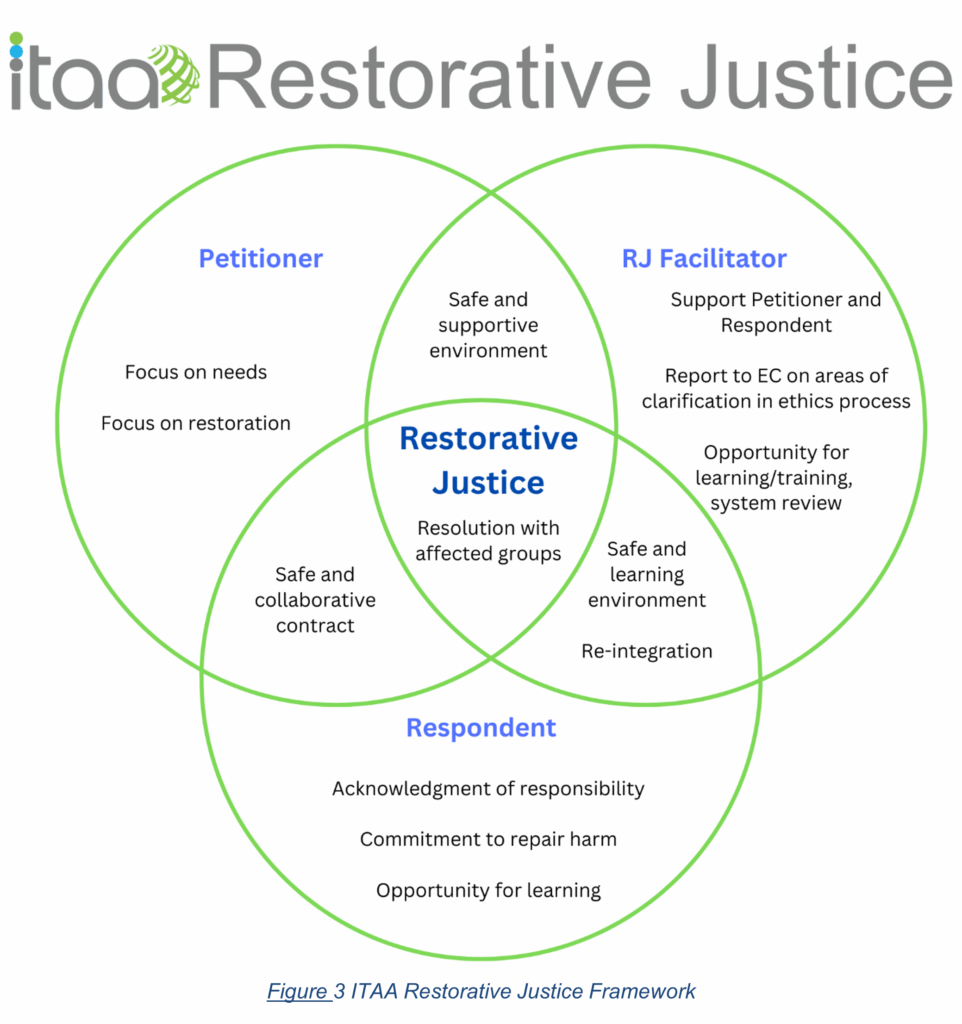Philosophies relating to the process
The committee will conduct the process with a philosophy of engagement with the Respondent and where appropriate, with their supervisor or appropriate support person to assess the concern in relation to the ITAA Principles and Code of Ethics and identify what learning can be gleaned.
If at any Phase of the process outlined in this manual the Respondent recognises their role in the Issue of Concern raised, the Restorative Justice Process may be entered into with the agreement of the Petitioner.
When the Ethics Committee commences the process of working through the phases below, they will take into consideration the various systems of all parties potentially at play in the Issue of Concern raised.
Every party in an affected group and that party’s own wider context, will be part of a system. The ITAA as a collective entity will also be a system on its own, and incorporates other systems (e.g. the 4 fields, the training and certification system, committees etc). Systemic thinking considers parties, contextual influences, processes, and anything else in a wider scope related to the individual and the ethical issue raised with the committee.
Examples of these systems (including personal, professional and cultural influences):
- The Practitioner’s systems (Psychotherapy, Counselling, Educational and Organisational)
- The client’s systems
- The trainer’s and trainee’s shared and individual systems
- The supervisor’s and supervisee’s shared and individual systems
- The generalised systems of politics, society, community, and economies
The list is not exhaustive; however it gives some examples of potential systems that could be at play.
Both the influence of systemic influences, and the Respondent’s influences on an ethical matter will be considered.
SPECIFIC CONSIDERATIONS
Throughout each phase of the process to address an ethical concern, the committee will note any ITAA-specific irregularities, loopholes, ambiguities, anomalies etc, which did or could have influenced the ethical concern raised. These issues will be addressed through the relevant ITAA channels, to ensure that all its systems (including documentation and processes) are robust and fit for purpose. Viewed through the lens of “contracting”, the ITAA systems can be categorised as follows:
- Procedural: This includes factors related to the ITAA documentation, procedures (e.g. training and certification) which impacted the issue. Example question, ‘Were the procedures and documentation robust, clear, detailed and appropriate enough to mitigate or respond to the ethical concerns?’
- Professional Organisation: Any factors which were/ are the responsibility of ITAA in relation to the Practitioner’s or member’s competence for their role. This may relate to training and certification issues in which a member or Practitioner’s readiness for their role is compromised. It may relate to office bearers’ or official role players’ competence for their role, or fulfilment of that role. Example question, ‘How did the ITAA’s organisational structure impact the ethical concern?’
- Professional Practitioner: This includes factors relating to the Practitioner’s competence for the role, the modality/ies used, the aim of the work, considerations of impacted groups.
- Psychological: These factors could include but are not exhaustive of ITAA role player’s bias stemming from: cultural, political, economic, racial, sexual orientation, which could be outside the persons’ awareness and impact the dynamics. Example questions, ‘Did any procedure written from a place of bias, or representative of a worldview impact the ethical concern?’, or ‘Did/does any ITAA role player’s bias or worldview impact the ethical concern?’
As well, the Ethics Committee will commit to ensure that any processes and formal enquiries are mindful, considerate of, and responsive to bias and/or prejudice towards any of the parties concerned, with the purpose of minimising its negative impact. Any ethics formal enquiry committee members will consider the following points:
- Check and be open to feedback regarding bias and address any personal bias arising from a process to address an ethical concern.
- Be prepared to respectfully challenge perceived bias and/or prejudice in any other role-player.
- Conduct all duties within an environment of learning and growth.
- At all stages of this process, the aim is to be consistent with the ITAA principles.
- At any Phase of the process where it is not possible to deliver an unbiased process to address an ethical concern, this process will be contracted to an external party/Conflict Resolution Entity for mediation, formal enquiry or other form of resolution.
- The External Party may consult with the Ethics Committee Chairs or appropriate delegated Ethics Committee Member on any matters of the ITAA Ethics Manual procedures at any stage while maintaining the confidentiality of the party/parties.
- The purposes of the consultation are to maintain a fair process for all parties, and to align with any aspect of the ITAA Ethics manual (including philosophy and procedures, for example recommendations in Phase 5: Post Formal Enquiry paragraph 4.)
- At the completion of the External Party’s deliberation, they will present a report to the Ethics Chair/s that covers:
- If mediation was undertaken, and its outcomes
- The Respondent has or has not contravened the Principles of the ITAA Code of Ethical Conduct.
- The Respondent accepts their part in the contravention and wishes to resolve it amicably through the Restorative Justice process, or does not accept any part of contravening the Principles of the ITAA Code of Ethical Conduct or take any responsibility for an effective resolution.
- The External Party may make recommendations to the Ethics Committee Chairs concerning process/procedures and/or systemic change.
- The roles and expectations of the external parties will be formally contracted at the commencement of the work.
THE Restorative Justice Process
The Restorative Justice Process has the purpose of bringing complete closure to all affected groups (including the Petitioner, Respondent and Ethics Committee) on resolution of a concern. As such, this may be activated at any phase of the process. Examples of this may be
- If at any Phase of the process outlined in this manual the Respondent recognises their role in the Issue of Concern raised, the Restorative Justice Process may be entered into with the agreement of the Petitioner.
- After a mediation process, to bring closure to all parties.
- At the end of a full formal enquiry, to bring closure to all parties.


